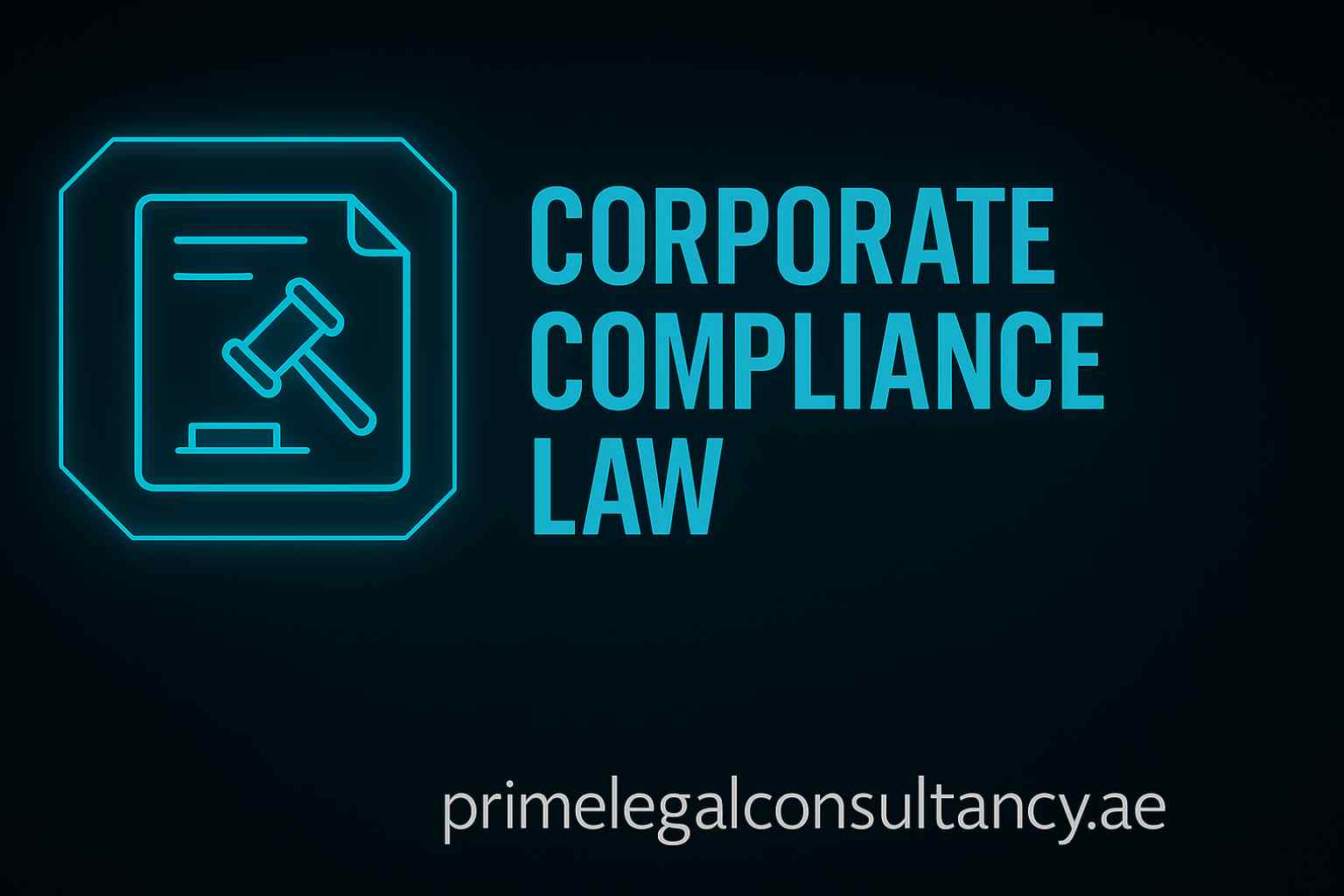Table of Contents
ToggleIntroduction
Corporate compliance law is more than a regulatory obligation; it’s the foundation of a responsible and legally sound business operation. As global markets become more complex, companies must follow laws, rules, and standards that govern their behaviour to protect stakeholders and ensure long-term sustainability. Corporate compliance law ensures that businesses operate ethically, avoid penalties, and build trust with investors, employees, and customers.
For businesses of all sizes, particularly those expanding internationally, understanding and implementing corporate compliance frameworks is crucial. These regulations touch on multiple aspects of business operations — from financial reporting and labour practices to anti-bribery laws and data protection policies.

Why Corporate Compliance Law Is Critical for Modern Businesses
Corporate compliance law plays a vital role in reducing the risk of financial loss, legal penalties, and reputational damage. Companies that ignore compliance may face regulatory scrutiny, litigation, or even shutdowns, depending on the severity of the violation. This makes compliance a strategic investment, not just a legal requirement.
Furthermore, effective compliance programs foster a positive workplace culture. When employees understand policies and procedures, they are more likely to report unethical behavior and act responsibly. This internal accountability is key to ensuring organizational resilience.
Key Components of Corporate Compliance Law
There are several components within corporate compliance law that companies must actively address. Two of the most essential include regulatory compliance and internal governance. Regulatory compliance ensures a business adheres to laws at the local, national, and international levels. Internal governance, on the other hand, relates to how a business creates internal rules, assigns responsibilities, and ensures ongoing monitoring.
Another key component is training and communication. Businesses must consistently train employees and leadership teams on the latest compliance requirements to maintain awareness and accountability across all levels of the organization.
Common Areas Governed by Corporate Compliance
Corporate compliance laws cover a wide range of operational domains. One of the most visible areas is data privacy and cybersecurity. With increasing reliance on digital platforms, regulatory bodies mandate strict controls on how companies collect, store, and use data.
Another major area involves anti-corruption and anti-bribery regulations. Many global laws, such as the U.S. Foreign Corrupt Practices Act (FCPA) and the UK Bribery Act, require businesses to implement strict anti-corruption policies to prevent illegal practices within their operations or partnerships.
Compliance Obligations by Industry and Jurisdiction
Not all compliance laws are universal — they often differ by industry and jurisdiction. For example, healthcare businesses must follow HIPAA in the United States, while financial institutions are governed by Basel III or SOX regulations depending on location. Understanding which laws apply to your sector is essential for maintaining compliance.
In regions such as the European Union, the General Data Protection Regulation (GDPR) plays a significant role in shaping compliance strategies for any business handling EU citizen data, regardless of where the business is located.

Benefits of Implementing Strong Compliance Programs
Businesses that actively follow corporate compliance law enjoy a variety of benefits. For one, these organizations are better positioned to attract investors and partners. Legal compliance signals a well-managed, low-risk business that’s less likely to experience disruptions.
Another benefit is improved operational efficiency. When businesses set clear policies, standard operating procedures, and routine audits, processes become streamlined and easier to manage, reducing the likelihood of costly errors.
Compliance vs. Risk Management: Understanding the Difference
Though often used interchangeably, compliance and risk management serve different purposes. Compliance ensures adherence to laws and internal policies, while risk management identifies and mitigates potential threats to a business’s success.
Both are essential for stability. Together, they create a proactive environment where legal requirements are met and potential future disruptions are anticipated and handled before they escalate.
The Role of Compliance Officers in Organizations
A compliance officer is a key figure in maintaining corporate integrity. Their primary responsibility includes overseeing compliance programs, conducting risk assessments, and ensuring that all departments follow regulatory guidelines.
Compliance officers also act as liaisons between regulatory bodies and the company. They must stay updated on emerging laws and adjust internal strategies to reflect those changes, making them vital to business continuity.
Key Compliance Laws by Region
| Region | Key Laws & Regulations | Focus Areas |
|---|---|---|
| United States | SOX, FCPA, HIPAA | Financial reporting, anti-bribery, health data privacy |
| European Union | GDPR, MiFID II | Data protection, financial integrity |
| Middle East | ESR, AML Laws, VAT Compliance | Economic substance, anti-money laundering, taxation |
| Asia-Pacific | PDPA (Singapore), FIE Laws (China) | Personal data, foreign investment rules |
| United Kingdom | UK Bribery Act, Data Protection Act | Anti-bribery, data management |

Best Practices to Strengthen Corporate Compliance
Companies looking to enhance compliance should begin with a detailed audit of existing processes. This helps identify gaps, assess risk levels, and prioritize improvement areas. A regular internal audit is essential for spotting non-compliance early and correcting it.
Technology also plays a key role. Automating compliance tracking, policy updates, and employee training modules can make adherence more efficient and consistent. Digital platforms reduce human error and ensure company-wide accountability.
Emerging Trends in Corporate Compliance Law
New trends are reshaping how compliance law is approached. ESG (Environmental, Social, Governance) compliance is gaining traction, requiring businesses to align operations with sustainable and ethical standards. Governments are increasingly mandating climate-related disclosures and diversity metrics.
Another trend is the shift towards real-time compliance monitoring. As AI and machine learning tools evolve, businesses can detect and respond to compliance issues instantly, reducing the risk of violations.
Also Read: UAE Commercial Companies Law Update 2025
Conclusion
Corporate compliance law serves as a vital framework for sustainable, ethical, and lawful business conduct. In a rapidly evolving regulatory landscape, businesses that embrace compliance proactively position themselves for success. From protecting data to ensuring fair labor practices, every component contributes to building a strong corporate foundation. By integrating compliance into the core of their operations, companies not only avoid risks but also unlock growth opportunities grounded in transparency and trust.
FAQ About Corporate Compliance Law
Q1: What is corporate compliance?
Ans: Corporate compliance refers to a company’s adherence to laws, regulations, and internal policies to avoid legal risks and maintain ethical standards.
Q2: What are the 7 elements of compliance?
Ans: They include policies, oversight, training, communication, monitoring, enforcement, and response to issues—forming a complete compliance framework.
Q3: What are the 5 key areas of compliance?
Ans: These include regulatory compliance, data protection, financial integrity, employment law, and health & safety standards.
Q4: What is corporate functions compliance?
Ans: It ensures that different departments like HR, finance, and operations follow legal and ethical practices within the organization.
Q5: What are the basics of corporate compliance?
Ans: The basics include setting rules, training employees, monitoring behaviour, and responding to violations effectively.
Q6: What is the role of corporate compliance?
Ans: Its role is to protect the company from legal penalties, promote ethical conduct, and build a trustworthy corporate culture.
Q7: How many elements are required for a corporate compliance program?
Ans: A standard compliance program typically includes 7 core elements to ensure legal and ethical adherence across the organization.
